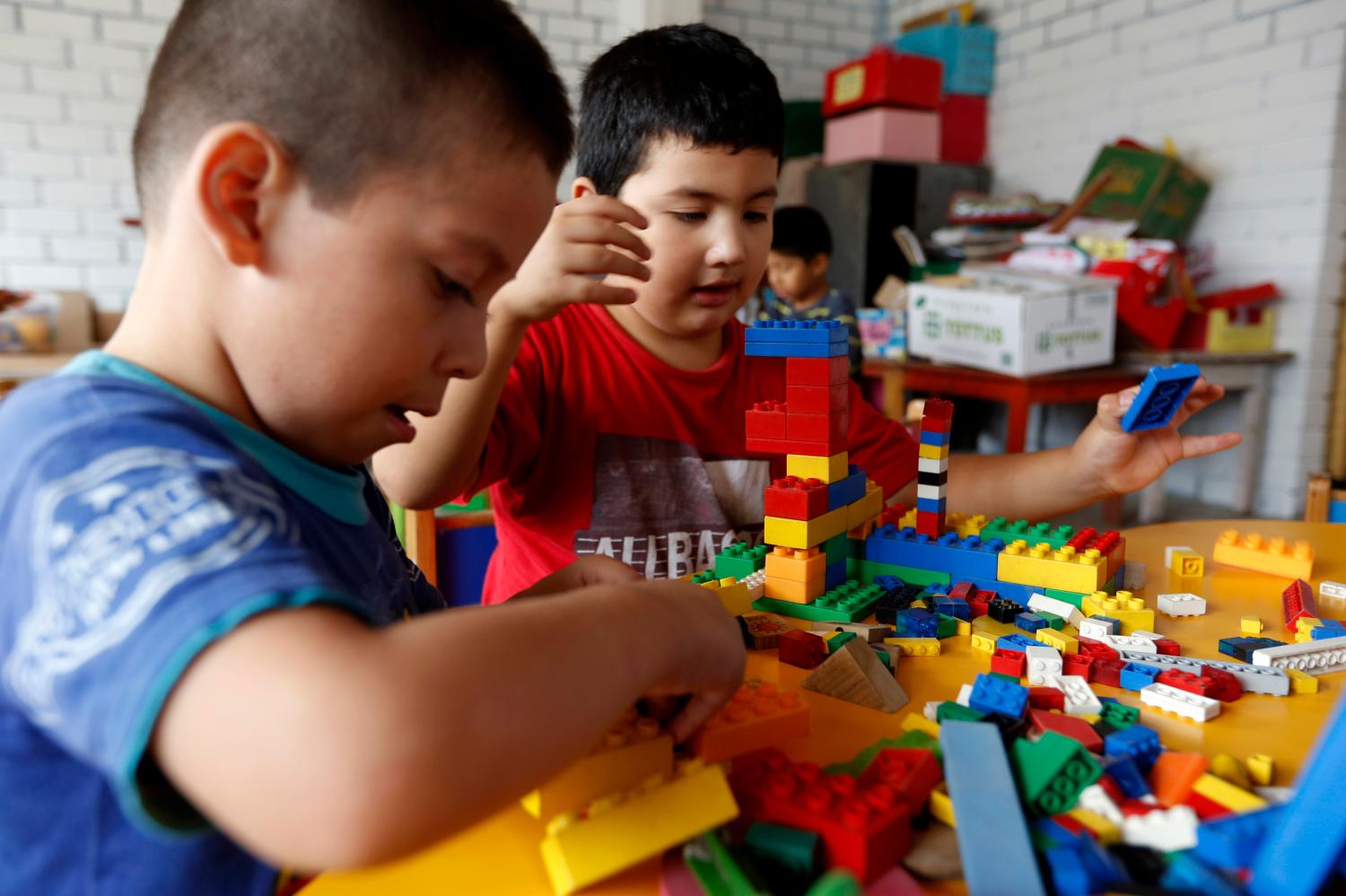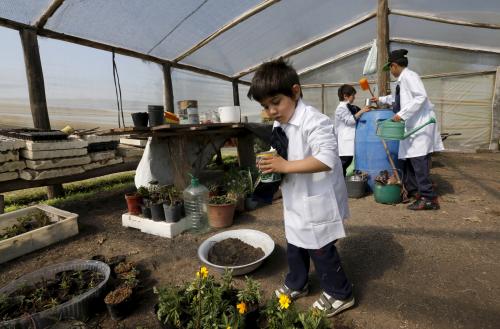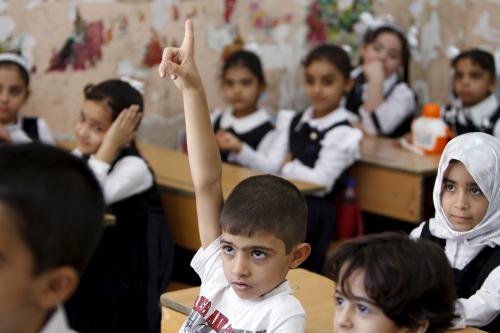The world has acknowledged the importance of early childhood development (ECD) services on the later-life success of individuals; however, data on the costs of delivering many of these interventions at scale is relatively scarce. Progress has been made on the costs of health interventions that benefit young children, but data on costs of the other services crucial to their development, including parent education, early cognitive stimulation, and pre-primary education, remain scant.
Collecting accurate and comparable cost information on ECD programs is particularly challenging, because these programs often rely on volunteer labor, share space and resources with other programs, and are managed in conjunction with other services. Programs also vary greatly in the frequency and duration of services, as well as the salaries of staff, all of which affect costs.
To spur the collection of further data, the Center for Universal Education (CUE) produced a framing paper and launched a working group on the subject in 2014, which includes representatives from the World Bank’s Strategic Impact Evaluation Fund and its Early Learning Partnership, the Inter-American Development Bank, UNICEF, the International Food Policy Research Institute, and the Abdul Latif Jameel Poverty Action Lab. The working group hosted a workshop of key actors costing early childhood programs in December of 2014, after which participants produced a series of blog posts drawing out some of the lessons learned, including lessons from the health sector, relevance to quality, and reflections on how costs change when services are combined or delivered at greater scale. Summaries of the working group’s costing efforts discussed at the workshop, as well as current updates, are listed below.
The Inter-American Development Bank (IDB)’s 2013 report on 28 childcare and four parenting programs across Latin America and the Caribbean included cost data on each of the programs and is a valuable source of cost data. The IDB published new data and analysis on ECD costs in its 2015 flagship publication on ECD. In particular, the authors calculated the costs of ECD programs with “enhanced” and “basic” structural and process quality (based on regional norms) for three countries and compared these with the benefits of these interventions.
The data in the IDB flagship report, as well as data from Jaramilo and Mingat (2008) represent that best data we have to date on ECD costs. A summary of these costs per child as a percentage of GDP per capita is presented in Figure 1.
Figure 1: Estimated cost of ECD services per child as percentage of GDP per capita
 Note: Data for Chile, Colombia, and Guatemala is based on “enhanced” structural and process quality. Authors’ calculations with data from Berlinsky and Schady (2015), Jaramillo and Mingat (2008), World Bank (2016).
Note: Data for Chile, Colombia, and Guatemala is based on “enhanced” structural and process quality. Authors’ calculations with data from Berlinsky and Schady (2015), Jaramillo and Mingat (2008), World Bank (2016).
Though these data provide an interesting overview of trends, they should be interpreted with caution. First, the costing models for the two studies differ, thus it challenging to compare across programs in different studies. Furthermore, the programs and contexts of implementation may vary greatly. Nonetheless, it is worth noting that in the three Latin American countries, parent education home visiting tends to be less expensive than preschool, which in turn tends to be less expensive than daycare. Data from four countries in Africa indicate that primary education is slightly less expensive than preschool per child.
UNICEF is leading an effort to collect cost data on preschool services in West and Central Africa, where only one out of four children attend public preschool facilities, but countries are increasingly keen to increase investment in quality and affordable services. UNICEF has provided high-level technical support for ad hoc capacity building of preschool education national leadership on costing of early learning services. It has also conducted national level budgeting exercises and capacity building workshops in Cape Verde, Cameroon, Congo, Ivory Coast, Sao Tomé, Senegal, Sierra Leone, Togo, and Mali and allowed countries to create a credible method for financing of early learning within the education sectors plans.
The budgeting tool used explored a set of scenarios for expansion of preschool activities forecasting sustained government investments in a 10-year period. The costing includes both a quantitative and qualitative perspective, taking into account the variety of preschool formulas existing in the majority of the countries and using results of early learning assessments to inform policy decisions on cost effectiveness. UNICEF reports that a “culture of costing preschool services” is now taking hold in the region and early learning is increasingly included in education sector analysis to inform the development of sector plans. Nevertheless, strategic support for planning and monitoring is needed to translate policy and financial commitments in actual change for most vulnerable young children in rural areas.
The Abdul Latif Jameel Poverty Action Lab (J-PAL) has developed a number of templates to collect cost data in the programs their affiliates are evaluating. They recently began asking all of the projects funded by their various initiatives to fill out a basic costing template that includes total program cost, average cost per beneficiary, and marginal cost to add a beneficiary. This template was first utilized in the first quarter of 2016.
The World Bank’s Early Learning Partnership (ELP) has completed work on the costs of preschool in four counties in Kenya, in partnership with Riara Univeristy and the Kenya School of Government. County-specific analysis for four counties (Kirinyaga, Nairobi, Nyamira, and Nyeri), as well as a summary note will be available on the ELP website in late September 2016. The publications summarize the process of devolution of ECD to the county governments and implications for county governments trying to scale access to quality services. The ELP has also completed work on the costs of scaling access to preschool in Sudan, which will be available in late September on the ELP webpage.
Although these efforts have contributed to the knowledge we have about ECD costs, there was yet a method available that 1) included the specific details of ECD programs that we know matter, 2) was broad enough to cover the range of ECD activities, 3) could provide micro-level program-specific data, and 4) could be extrapolated for macro-level budgeting. The working group agreed that it would be useful to combine their respective experiences into one standard and publicly available template that included all of these elements. Consequently, CUE and the Strategic Impact Evaluation Fund at the World Bank decided to jointly lead an effort to develop such a template. The costing template has been designed in collaboration with the working group, and together we have grappled with how to account for imputed costs, how to balance standardization and flexibility, how to cost integrated programs, and how to embed unit cost analysis.
The template is being piloted to collect cost data on early stimulation and preschool programs in Bangladesh, Mali, and Malawi, in addition to other countries in the near future. The template will be used to do cost projections of implementing the three programs at scale in their respective countries. The results and lessons learned will be published in January 2017.
At the Center for Universal Education, we will continue to share the lessons learned across working group’s efforts. We hope that the costing tool that we have developed together with the World Bank will provide a standard methodology for collecting cost data for ECD interventions, which can be used to build a comparable database of costs as well as cost-effectiveness of programs. Our goal is that this information will help funders and implementers to overcome barriers of program budgeting and ensure access to quality programs in the future.
Note: The authors are grateful to the above-mentioned organizations for providing updated information on their programs.
The Brookings Institution is committed to quality, independence, and impact.
We are supported by a diverse array of funders. In line with our values and policies, each Brookings publication represents the sole views of its author(s).








Commentary
Updates from the field on costing early childhood development
September 22, 2016